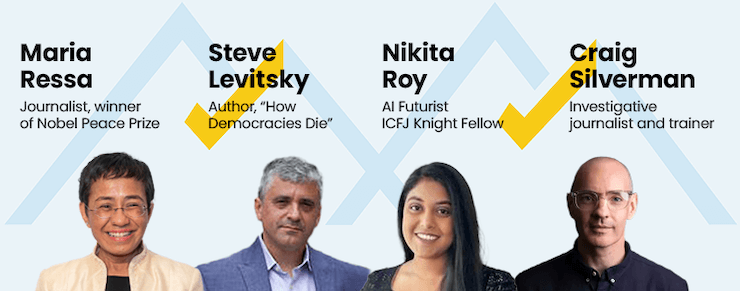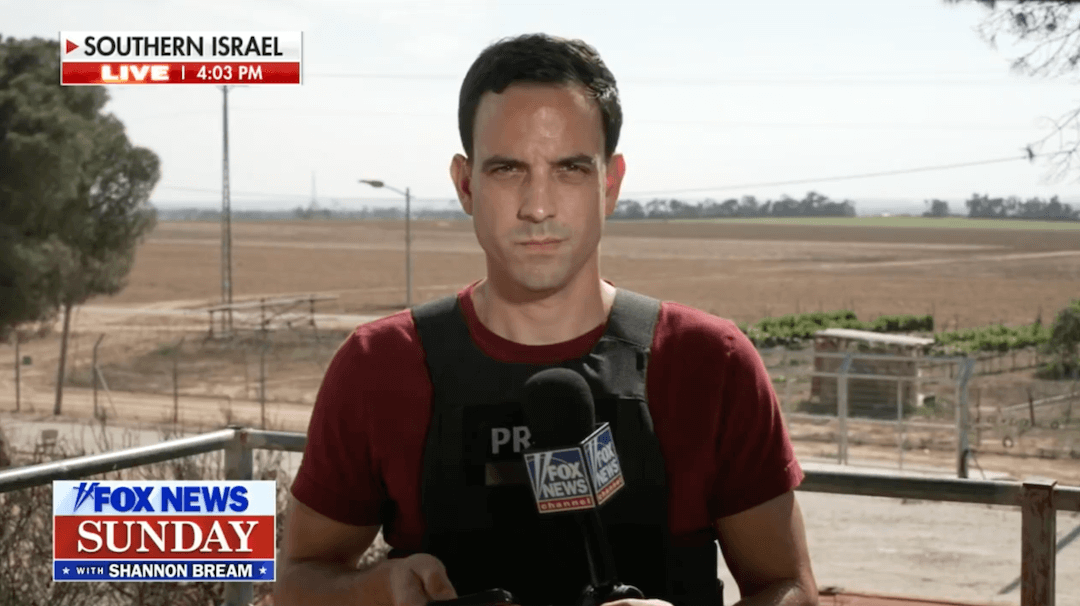Racism. Health disparities. Campus consolidation. Diversity. These were among the many topics tackled by student media organizations this year in conjunction with a Poynter program designed to empower students journalists.
Is it your school’s turn next?
Applications are now open for the Poynter College Media Project.
This year’s one-semester program will offer five independent student media organizations the chance to work with Poynter to investigate an issue on campus. If selected, your school will also receive a $1,500 grant to pursue the project, and all the help Poynter can throw at you. Thanks to a grant from the Charles Koch Foundation, the program will be offered at no change to the five schools selected.
You can read all the details here. Applicants should be students, not professors or administrators (but you can and should encourage your students to apply).
As for what we’re going to be looking for in an applicant: Unfortunately, being my buddy won’t help (though it will help if you need a coffee date or beer buddy in St. Pete someday). What will help is having a well-thought-out local project that will stand out from other entries. We want to hear from newspapers, TV stations, radio stations — anything that’s student-run and produces real news.
I’ll give you this peek behind the curtain: We got more than 60 entries for this program in the spring of 2020, and we had to turn down some really great campus media programs. But when something unique popped up, we perked up.
Take, for example, the University of Kansas, which like many schools struggled with its administration. Instead of telling us “We are struggling with our administration,” editor-in-chief-to-be Nicole Asbury wrote, “We propose a five-part project that would examine how students, faculty, staff, taxpayers and other stakeholders — as well as the university itself — have been harmed by this public institution’s repeated decisions not to share with the public important information about hazing and sexual violence, as well as even more routine matters.”
And University of Richmond editor Olivia Diaz didn’t say, “Race relations on campus are tense and we want to explore that.” She wrote, “In August of 2019, The Collegian reported on evidence that suggested a burial ground of enslaved people lies beneath the University of Richmond’s campus. As the UR community approaches August of 2020, a year since the story first broke to the public, how is the UR campus coming to terms with its own past?”
You get the idea. Again, check out the course page and application information for all the fine print, but I hope you’ll commit to helping bring this to your student media group’s attention. You never know what campus Poynter might show up at this semester!
Applications are due May 3.
Tips for teaching podcasting
I got a question this week about resources for teaching it. I have two places I recommend — NPR and The New York Times. Both offer concise, student-friendly, non-condescending how-to guides that can be repurposed as lessons for classroom instruction, or sent directly to students. If you read them carefully, you’ll eliminate 95% of the silly mistakes we all make when we start out.
Poynter headlines

In this March 2015 file photo, Oklahoma state Sen. Anastasia Pittman, left, stands with Levi Pettit, a former University of Oklahoma fraternity member caught on video leading a racist chant, during a news conference at Fairview Baptist Church in Oklahoma City. Pettit apologized for the chant. (AP Photo/Sue Ogrocki, File)
I’m always up to hear pitches from professors, advisers and students about the most pressing issues facing journalism in higher education. Here are two such pieces that ran this week. I’m especially interested in hearing from journalists of color.
- The university response to offensive speech often reflects a feeble commitment to diversity, equity and inclusion (Michael Bugeja, Iowa State)
- Teaching news research gives your students a superpower (Barbara Gray, CUNY )
Major court case
Our friends at the Student Press Law Center are abuzz about this one: “This month the U.S. Supreme Court will hear arguments in Mahanoy Area School Dist. v. B.L., a student speech case that could fundamentally alter how future generations understand the idea of free speech in America.”
The SPLC said it has submitted an amicus brief on the case, which was co-signed by JEA, NSPA and Quill and Scroll, among others.
If you want to read a delightful legal take (yes, those words can live together in a sentence in harmony), check out Frank LoMonte’s “The Future of Student Free Speech Comes Down to a Foul-Mouthed Cheerleader,” featuring such delightful sentences as, “You can’t be a little bit pregnant, and you can’t be a little bit constitutionally unprotected, either,” and a closing paragraph that will make First Amendment freedom fighters stand on their desks and recite Whitman.
One to watch
I expect this list to grow: “Here’s a List of Colleges That Will Require Students to Be Vaccinated Against Covid-19.” What’s your school’s plan around mandating vaccines? Have you reported on it?
Follow the money, always.
Well this is awful: “Report: State cost (HBCU Tennessee State University) tens of millions in land grant funding.” The implications of this are pretty staggering, but it’s also a blueprint for an investigation your students could do. Here are the 19 HBCU land grant universities — are you at one of them, or is your state home to one? Have state appropriations been fair and transparent? Who’s going to be shocked if Tennessee is the only place where this happened? And who better than student journalists to ask for the records and do the math? Go get ‘em!
What’s in a name
Are you keeping an eye on building names on your campus? There are a lot of storyies ideas not just about the names behind buildings on your particular campus, but the discussion happening around the country. Campus building names have been a controversy in the making for decades, but it feels like things are heating up. What are the implications and costs of renaming buildings? How do these actions fit into the overall diversity, equity and inclusion plans that so many universities are espousing?
People are starting to dig in on opposite sides of the issue, like at the University of Richmond — “Debate over racism, building names intensifies at University of Richmond as top trustee comes under scrutiny” — and then there’s U-M students, faculty host mock renaming of Weiser Hall from The Michigan Daily.
College headlines
- High School Seniors Ask, ‘What Will College Look Like Next Fall?’ (NPR)
- What Asian American Student Activists Want (The Chronicle for Higher Education)
- Racist graffiti found at Xavier U., Northern Kentucky U. for second time this year (Cincinnati Enquirer)
Great journalism to share with your students
- What mourning looks like (interactive, The New York Times)
- Analysis reveals nearly 200 died in Texas cold storm and blackouts, almost double the official count (text, Houston Chronicle)
- ‘You’re only crippling us’: Banks own many of Dallas’ low-income, high-crime apartments — and they’re rewarded for it (text and videos, WFAA Dallas)
- St. Petersburg woman thought best friend was lost in Holocaust. Now, they Zoom. (text, Tampa Bay Times)
Internship Database
The New York Times, the Miami Herald and the USA Today Network are offering several new investigative internships this summer. These 10-week paid internships are made possible by the Ida B. Wells Society, “a news trade organization whose mission is to increase the representation and profile of reporters and editors of color in the field of investigative reporting.” The society notes that students who come from underrepresented communities, HBCUs and other minority-serving institutions will receive special consideration. To qualify, you must be a member of the society. Membership is free and the application is quick and easy.
The deadline to apply for The New York Times internship is April 19 at 5 p.m. Eastern.
The deadline for the Miami Herald internship is April 23 at 5 p.m. Eastern.
The deadline for one of two spots at USA Today Network is May 1 at 5 p.m. Easterm.
The Lead
I can’t help but be impressed with the results of the College Media Madness campaign — now more than $96,000? That’s not pocket change. You can read more about who raked in that blue sky money and lament not getting involved (hey! There’s always next year!) in the latest issue of The Lead. You can also read the background here. Subscribe to The Lead here, and encourage your students to do the same.
This week’s Professor’s Press Pass
In March, a small media outlet called The American Prospect made a big accusation: that CNN had aired a staged border crossing of the Rio Grande. Both CNN and the Border Patrol denied having staged the event or having knowledge that it was staged. This week’s Professor’s Press Pass asks your students to examine the issue by watching the CNN story and then reading about why it seemed suspicious to experts. It also gives you a chance to discuss when — if ever — it’s appropriate to use staged footage.
Resources for Journalists
- College Media Project: Apply to be one of five independent student media publications in this semester-long accelerator program — Apply by May 2
- Virtual Teachapalooza: Front-edge Teaching Tools for College Educators — Apply by May 10
- United Facts of America: A Festival of Fact-checking with special guest Dr. Anthony Fauci — Join us May 10-13
- Get access to a growing library of case studies — Professor’s Press Pass







